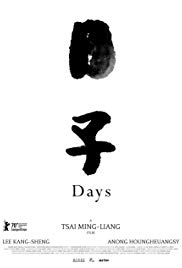
RIZI/ DAYS
Taiwan, 2020, 127 minutes, Colour.
Kang-sheng Lee, Anong Houngheuangsy.
Directed byTsai Ming Liang
At the beginning of the film it is stated that there are no subtitles, intentionally. As the film progresses, they are not needed.
The director has made a number of films but is also interested in virtual reality. This is a very evident in the cinematic style, the succession of takes, the length of the takes, the equivalent of either paintings in an art gallery or visual sequences for an installation. To that extent, the film is for connoisseurs of art, for those interested in extending the bounds of cinema.
It can be said that with this kind of film, the director has control of the audience if they are willing to stay. With an art gallery or with a museum and installations, how much time and attention is given to each picture or sequence is the choice of the audience, to stay, to move on, to exit. This is not possible with a film like Days when the audience opts to stay.
The director had established a reputation in the 1990s, winning awards with the l’Amour and Goodbye, Dragon In. There was more sexual emphasis in consequent films, pornography in The Wayward Cloud, 2005, and I Don’t Want to Sleep Alone, filmed in Malaysia, 2007.
The film opens with long takes focusing on two men. There are some glimpses of outside scenery throughout the film but most of the segments are interiors or local streets. There is long sequence, for instance, of the preparation and making of a meal.
The director has always been interested in sexuality, in sexual orientation, in gay encounters between men. Days has what may be the longest sequence of erotic massage, an intensity of focus.
To the extent that there is a focus on the two men, there is some kind of narrative – but with the final images, there is a long close-up of the older man sleeping and then on his face, awake. Whereas the masseur Since on a bench in the street and, eventually, moves on. Significant it is a gift that the older man makes to the younger, a small music box which contains Charles Chaplin’s theme from Limelight – I’ll be loving you eternally, repeated over and over.
The word eternally reminds the audience that watching a film like this over two hours is also an experiment in the observation of time, time passing, the effect of time.
Literally an arthouse film experience.